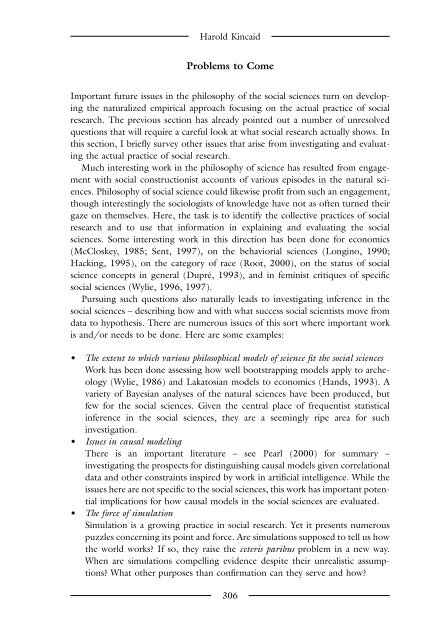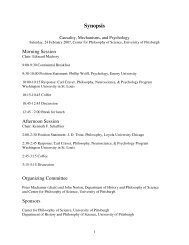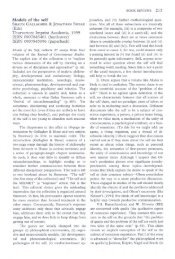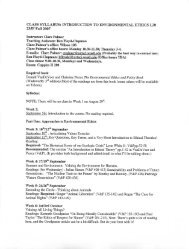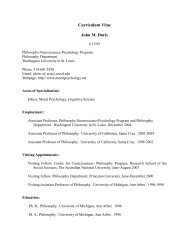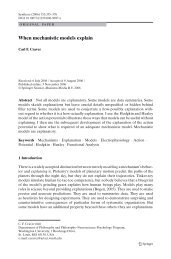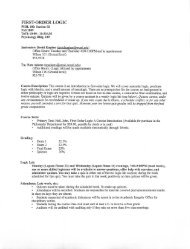The Blackwell Guide to the Philosophy of Science - The Department ...
The Blackwell Guide to the Philosophy of Science - The Department ...
The Blackwell Guide to the Philosophy of Science - The Department ...
Create successful ePaper yourself
Turn your PDF publications into a flip-book with our unique Google optimized e-Paper software.
Harold Kincaid<br />
Problems <strong>to</strong> Come<br />
Important future issues in <strong>the</strong> philosophy <strong>of</strong> <strong>the</strong> social sciences turn on developing<br />
<strong>the</strong> naturalized empirical approach focusing on <strong>the</strong> actual practice <strong>of</strong> social<br />
research. <strong>The</strong> previous section has already pointed out a number <strong>of</strong> unresolved<br />
questions that will require a careful look at what social research actually shows. In<br />
this section, I briefly survey o<strong>the</strong>r issues that arise from investigating and evaluating<br />
<strong>the</strong> actual practice <strong>of</strong> social research.<br />
Much interesting work in <strong>the</strong> philosophy <strong>of</strong> science has resulted from engagement<br />
with social constructionist accounts <strong>of</strong> various episodes in <strong>the</strong> natural sciences.<br />
<strong>Philosophy</strong> <strong>of</strong> social science could likewise pr<strong>of</strong>it from such an engagement,<br />
though interestingly <strong>the</strong> sociologists <strong>of</strong> knowledge have not as <strong>of</strong>ten turned <strong>the</strong>ir<br />
gaze on <strong>the</strong>mselves. Here, <strong>the</strong> task is <strong>to</strong> identify <strong>the</strong> collective practices <strong>of</strong> social<br />
research and <strong>to</strong> use that information in explaining and evaluating <strong>the</strong> social<br />
sciences. Some interesting work in this direction has been done for economics<br />
(McCloskey, 1985; Sent, 1997), on <strong>the</strong> behaviorial sciences (Longino, 1990;<br />
Hacking, 1995), on <strong>the</strong> category <strong>of</strong> race (Root, 2000), on <strong>the</strong> status <strong>of</strong> social<br />
science concepts in general (Dupré, 1993), and in feminist critiques <strong>of</strong> specific<br />
social sciences (Wylie, 1996, 1997).<br />
Pursuing such questions also naturally leads <strong>to</strong> investigating inference in <strong>the</strong><br />
social sciences – describing how and with what success social scientists move from<br />
data <strong>to</strong> hypo<strong>the</strong>sis. <strong>The</strong>re are numerous issues <strong>of</strong> this sort where important work<br />
is and/or needs <strong>to</strong> be done. Here are some examples:<br />
• <strong>The</strong> extent <strong>to</strong> which various philosophical models <strong>of</strong> science fit <strong>the</strong> social sciences<br />
Work has been done assessing how well bootstrapping models apply <strong>to</strong> archeology<br />
(Wylie, 1986) and Laka<strong>to</strong>sian models <strong>to</strong> economics (Hands, 1993). A<br />
variety <strong>of</strong> Bayesian analyses <strong>of</strong> <strong>the</strong> natural sciences have been produced, but<br />
few for <strong>the</strong> social sciences. Given <strong>the</strong> central place <strong>of</strong> frequentist statistical<br />
inference in <strong>the</strong> social sciences, <strong>the</strong>y are a seemingly ripe area for such<br />
investigation.<br />
• Issues in causal modeling<br />
<strong>The</strong>re is an important literature – see Pearl (2000) for summary –<br />
investigating <strong>the</strong> prospects for distinguishing causal models given correlational<br />
data and o<strong>the</strong>r constraints inspired by work in artificial intelligence. While <strong>the</strong><br />
issues here are not specific <strong>to</strong> <strong>the</strong> social sciences, this work has important potential<br />
implications for how causal models in <strong>the</strong> social sciences are evaluated.<br />
• <strong>The</strong> force <strong>of</strong> simulation<br />
Simulation is a growing practice in social research. Yet it presents numerous<br />
puzzles concerning its point and force. Are simulations supposed <strong>to</strong> tell us how<br />
<strong>the</strong> world works? If so, <strong>the</strong>y raise <strong>the</strong> ceteris paribus problem in a new way.<br />
When are simulations compelling evidence despite <strong>the</strong>ir unrealistic assumptions?<br />
What o<strong>the</strong>r purposes than confirmation can <strong>the</strong>y serve and how?<br />
306


